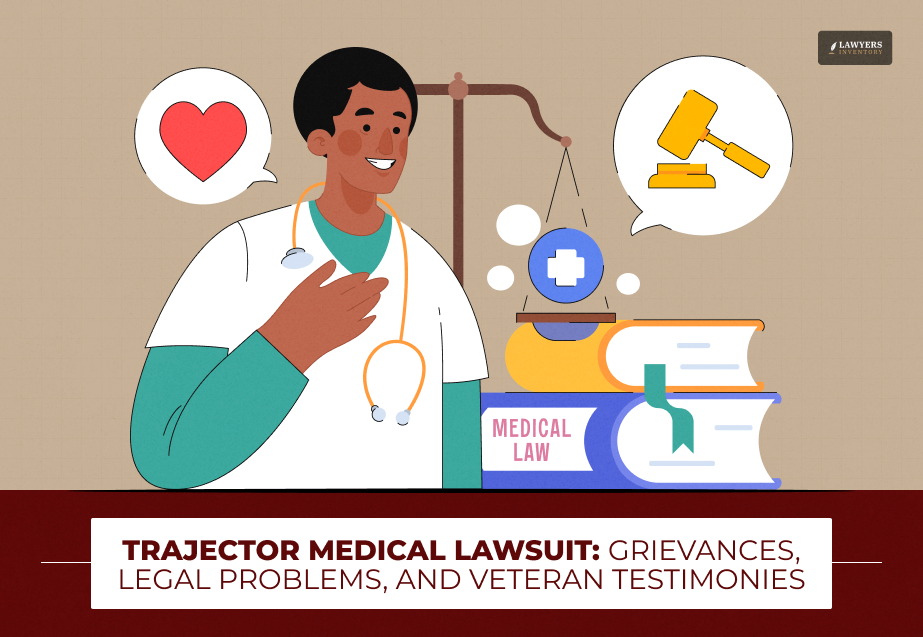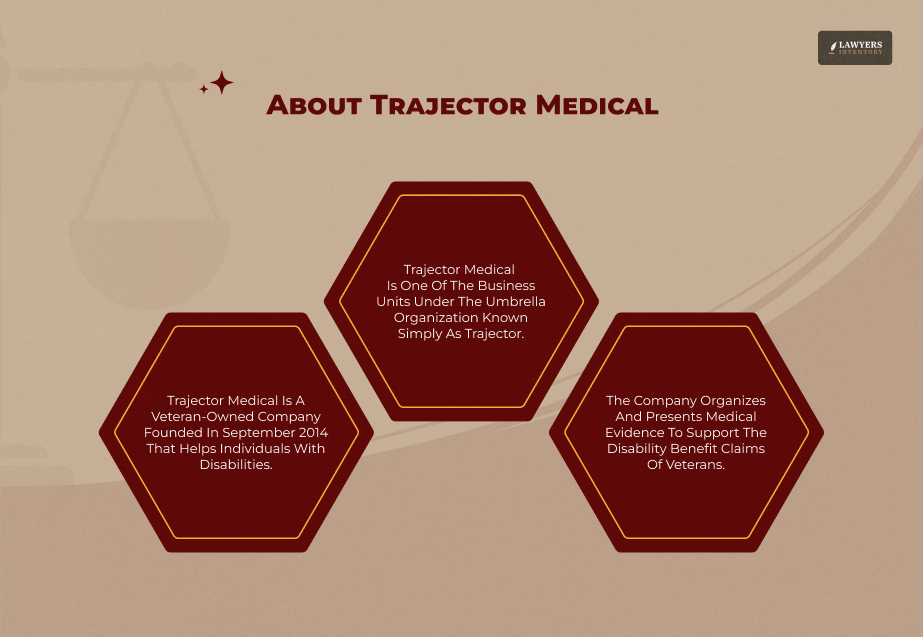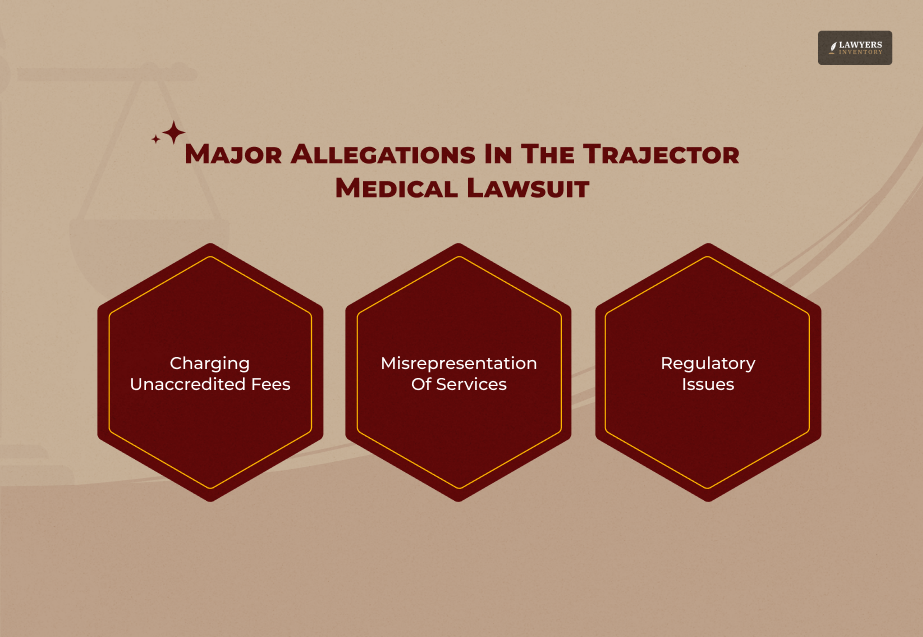
In this article, we talk about the Trajector Medical Lawsuit. Daily, veterans submit disability claims. Thousands request support in dealing with the experience.
Trajector Medical, for example, provides medical evidence services on such veteran disability claims. The company assists veterans in determining their medical conditions. Trajector Medical Lawsuits and public grievances are mostly regarding how it conducts business.
Knowledge of the issues in the Trajector Medical lawsuit is important. Veterans need knowledge beforehand when choosing services. Policymakers also respond to questions. They engage in anti-fraud efforts and advocacy for veterans.
Therefore, full knowledge of the company’s courtroom battles is necessary. The principal issue is often the model of charges that the company uses. This problem is what drives the whole Trajector Medical lawsuit.
Background Of Trajector Medical

Trajector Medical is now a company that provides medical evidence services.
There is use of Vet Comp and Pen to help veterans document medical conditions. They want to help with official VA disability claims. But they are not a Veterans Service Organization (VSO). And they are not VA-accredited claims agents or attorneys. That’s something all veterans should know.
Trajector Medical Reviews
They provide consultations from board-certified physicians. Next, they review a veteran’s medical records.
Additionally, they then trace symptoms to potential disabilities. Trajector Medical only charges if a veteran is awarded an increased disability rating. They pattern their system after a fee of five times the increase in compensation per month.
Thus, they claim that they only submit medical evidence and do not actually file the claim. This technical loophole allows them to work outside of standard VA fee policies.
You can learn more about the lawsuit from their official website.
Allegations And Lawsuits

The character of litigation issues is contract dispute-based. Veterans frequently complain of surprise bills. They also experience tremendous difficulty when trying to cancel contracts. In others, veterans said they could not get a copy of their executed contracts.
On top of this, billing has been contested by the veterans. Other veterans report that Trajector Medical continues to bill them fees even after services have ceased. The companies track the rating of the veteran’s disability.
Then they bill the veteran for any rise that follows. This, even though Trajector Medical had absolutely nothing to do with the following claim or appeal. Due to this, veterans stand to be ambushed by enormous bills.
Regulatory Issues
Yes, these issues also propel the Trajector Medical lawsuit. The critics consider the company’s operations to be in contravention of VA rules. The rules in question relate to non-accredited support for veterans.
According to the legislation, only VA-accredited employees can handle first-time claims, and they cannot charge a fee. Organizations such as the VFW contend that such operations are against the law.
Finally, the Trajector Medical suit calls into question the legality of the company’s business model itself. The company is highly likely to incur an extremely high legal risk on this count. Additionally, the Trajector Medical suit finding will affect a number of such companies.
Veteran Experiences And Testimonials
Veteran company reviews show two sides to the coin. Some veterans leave positive outcomes. They achieve better disability ratings after using the services provided by Trajector Medical. Therefore, they leave positive reviews for Trajector Medical. They consider the service worthwhile because their benefits have increased notably.
Trajector Medical commonly uses such testimonials to market its service. They possess a high Trajector medical success rate.
Conversely, the majority are very unhappy. Their Trajector medical complaints mostly reflect issues like outrageously high fees and a lack of transparency. Some veterans feel that the company did not do much better than rephrase the veteran’s own words.
Read Also: Camp Lejeune Lawsuit: How is the Government Dealing With the Class Action?
Better Business Bureau (BBB)
On top of this, billing harassment and contract disputes add to the list of Trajector medical complaints filed with the Better Business Bureau (BBB). This contest has clearly created two camps within the veteran community. The Trajector Medical lawsuit, in truth, is about just this gap in expectation.
Legal And Regulatory Framework
The law regulates veterans’ assistance strictly. VA accreditation requirements are clearly laid out. Only VA-accredited claims representatives, attorneys, and Veterans Service Officers (VSOs) are permitted officially to assist with claims.
Accreditation guarantees that the quality of service will be maintained for veterans. Accreditation limits the fee of some services.
Federal law (38 U.S.C. § 5901) prohibits unaccredited individuals or companies from helping a veteran prepare, present, or prosecute a claim for compensation.
1. Consumer Protection Laws
Federal and state laws protect veterans from fraud or deceit. The VA has even launched VSAFE. It is a government-wide call center and online resource. It helps to report fraud and deceptive cons to veterans.
Congress also reviews legislation such as the GUARD VA Benefits Act. This legislation would reinstate criminal sanctions. It would make it illegal for businesses to charge prohibited fees to veterans.
The GUARD Act appeal attests to how seriously Congress members take the issues the Trajector Medical lawsuit and similar cases raise.
2. Analysis And Policy Implications
This leaves a tough decision. Vets are faced with a massive VA claims backlog. Initiatives like Trajector Medical claim that they are plugging a necessary gap. They provide instantaneous medical documentation, something VSOs cannot do in a timely way. But this fee-based, private system causes erosion of trust among veterans.
That is the main impact assessment point. Vets do not trust any form of medical evidence services for vets. So, trust in legitimate veteran support groups is affected as well.
3. Comparative Analysis
Comparative analysis shows the difference clearly.
VSOs supply help pro bono to the veteran. Accredited lawyers can charge fees, but only on initial denial, and those fees are controlled. Trajector Medical charges a share of future benefits, without such safeguards. This unaccredited plan for claim help must be addressed by firm policy action.
Legislators must find a path to control this business. They must safeguard the constitutional rights of veterans and allow them to obtain the required medical information. This policy shift will most probably be the outcome of the publicity given to the case through the Trajector Medical lawsuit.
Read Also: False Military Service Claims: Know About the Legal Consequences
Expert Analysis And Recommendations
Lawyers practicing veterans’ law are candid. They assert the legality of such practices is extremely questionable. The catch in the problem is whether or not “medical evidence consulting” is “assisting with a claim.” Trajector Medical’s case will be challenged on this construction in court. The court’s ruling will establish an adamant precedent.
Protect yourself.
First, look for any company’s accreditation. Use the VA’s Office of General Counsel (OGC) database. Secondly, check all contracts thoroughly. Make certain to examine cancellation provisions and fee charts carefully.
Veterans must remember one thing: help on a first claim is always free with accredited representation. Veteran fraud protection starts with know-how. Thus, find accredited representation when making VA accreditation requirements claims.
Read Also: ROC Nation Kansas City Police Lawsuit – Exposing Police Misconduct And Corruption
Frequently Asked Questions (FAQs):
The goal is simple to see: maximize your benefits without building illegal or unnecessary debt. They should never sign without first reading the contract carefully. They should always visit accredited VSOs or attorneys. This caution does not constitute an excuse for the financial loss highlighted by the ongoing Trajector Medical suit.
The company only charges for medical evidence services, but not for representation of claims. Federal code (38 U.S.C. § 5901) prohibits unaccredited companies from charging for helping original claims. Laws like the Trajector Medical lawsuit question this subtlety. The VA considers this predatory.
Read your contract as quickly as possible. Second, have a VA-approved claims agent or attorney advise you. Unapproved companies generally do not pursue these contracts in court. You can also notify the VA’s VSAFE fraud hotline (1-833-38V-SAFE) to aid veteran fraud prevention initiatives.
Always verify accreditation via the VA Office of General Counsel (OGC) database. Obtain help from VSOs (Veterans Service Organizations) or VA-approved representatives. They provide help with original claims at no cost. It ensures all VA accreditation standards are fulfilled and protects your veteran’s legal rights.





![Understanding The Pay Transparency Law Of Massachusetts [2026 Guide]](https://lawyersinventory.com/wp-content/uploads/2026/02/massachusetts-pay-transparency-law-100x100.png)




0 Reply
No comments yet.